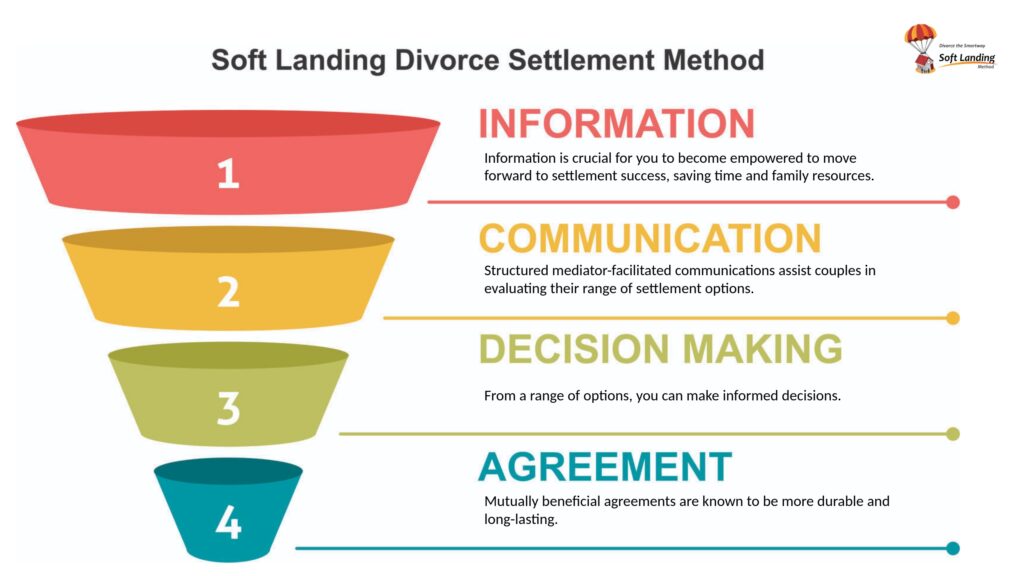What is a Cohabitation Agreement? Is it useful in Ontario?

Get Acquainted Call
Do you want a Soft Landing?
Have a few questions?
Learn More:
Schedule a 15-Minute Complimentary Call
Family law draws a distinction between a common-law relationship and a formal marriage.
Common-law partners do not enjoy as much protection as married couples do under the law.
A cohabitation agreement is a contract that is usually made between partners in a common-law relationship.
You may be responsible for the debts of your partner.
If the parties wish to share assets and debts, then they can exercise their intentions in a cohabitation agreement to that effect.
Use a cohabitation agreement to determine how their property will be treated in the event of separation.
Partners in a common law relationship often believe that after living together for a while, they become as good as married. While this may be true in a sense, especially as it concerns living together and building a family, it is mostly inaccurate.
In many ways, the law draws a distinction between a common law relationship and a formal marriage. These differences are most obvious when it concerns matters such as separation, division of marital assets and ownership of property acquired during the marriage.
Essentially, common law partners do not enjoy as much protection as formally married couples do under the law. Where formally married couples can expect certain benefits as a matter of right, these either do not exist for common law partners, or can only be obtained in a complex process.
As a result, it is natural for partners in a common law relationship to try and provide ways to protect their rights during and after the relationship. Signing a cohabitation agreement is one of the ways in which they can achieve this. What is a cohabitation agreement and what does it do? Here’s all you should know.
What is a cohabitation agreement?
A cohabitation agreement, often crafted between common law partners, serves as a legally binding contract. This agreement facilitates the protection of individual interests and property rights within a common law relationship, delineating the parties’ respective rights and obligations should the relationship end.

An Ontario cohabitation agreement takes into account these laws, acknowledging that property acquired, and even debts accumulated during the relationship, might be considered shared property. This arrangement implies that, contrary to one’s intentions, one could be held accountable for a partner’s debts, irrespective of one’s contribution towards incurring them. Regrettably, the majority of individuals are uninformed about these laws and their implications.
Cohabitation agreements empower partners in a common law relationship with the liberty to make decisions on these matters. If the parties desire to equally share their finances, assets, and debts, they can enforce this through their cohabitation agreement. Similarly, if they seek more control over their own property and financial circumstances, a cohabitation agreement provides an avenue to achieve this.
Cohabitation agreements also enable formally married couples to establish their financial interests and obligations. In this context, the agreement is referred to as a “Marriage Contract”. According to Ontario’s Family Law Act (FLA), if common law spouses decide to marry, their existing cohabitation agreement automatically transitions into a marriage contract.
Most common law couples employ cohabitation agreements to predetermine the division of property in the event of separation. Others use these agreements to resolve crucial issues arising during the relationship, such as accountability for expenses, management of income, etc.
However, two crucial points require attention. Firstly, the FLA clarifies that a cohabitation agreement cannot stipulate conditions regarding child custody or child support. These vital issues can only be addressed if and when a separation occurs, not at the relationship’s inception.
Secondly, if the agreement outlines how the matrimonial home (shared residence) will be treated, these provisions may require modifications if the couple chooses to marry. In a formal marriage, both parties possess an equal right to occupy the matrimonial home, a fact that cannot be altered by either a cohabitation agreement or a marriage contract.
Please remember to seek independent legal advice to ensure your cohabitation agreement properly protects your individual rights.
When is a cohabitation agreement useful?
Generally, there are no laws that dictate who should or should not enter into a cohabitation agreement. This means you and your partner are free to have a cohabitation agreement whenever you want. However, there are some instances when having the agreement will be important.
The first, and most common, reason is to protect the separate property, debt and income of both partners. This can be useful to prevent creditors from having access to the property of both partners, or to prevent either partner from making claims on the other’s assets.
A cohabitation agreement will also be useful if both or either partner has substantial assets they are bringing into the relationship. They might also want to protect their assets if they have an expectation of a significant raise in income or a financial windfall after the start of the relationship.
This does not mean they are unwilling to share the property with their partner. It only gives them freedom over how they want to treat the property. The same applies if either or both spouses have significant debts going into the relationship.
Another important reason is to avoid the complexity of a court-supervised process. There are many complicated rules that partners may have to rely on for division of marital property if they eventually separate. Rather than take a chance on these rules they barely understand, partners can instead agree on how they want to treat their own property by themselves.
When should you sign a cohabitation agreement?
Just like there’s no rule dictating who can make a cohabitation agreement, there are no rules as to when to make one. Generally speaking, you may sign a cohabitation agreement before your relationship, right at the start, or at any time while it is ongoing.
However, as any professional would advise, it is often best to have a cohabitation agreement in place before or right at the start of the relationship. The reason for this is it can be easier to come to an agreement at this stage than at any other stage in the relationship. If left till later, certain issues may have already come up or there may already be expectations that may make signing an agreement difficult.
While it’s definitely uncomfortable to start talking about the possibility of separation when you are just starting your relationship, there’s no better time than this. In truth, it is an opportunity for both partners to show their commitment to protect each other, even if they are no longer together.
Legal and formal requirements for cohabitation agreements
Although cohabitation agreements are mostly left to the parties involved, there are certain legal requirements for a valid agreement. The first of this is that it must be entirely voluntary. While this sounds obvious, it can be easy to make a mistake here or overlook an important factor that affects voluntariness.
For instance, not having a lawyer present while the other partner has a lawyer may raise questions about whether both partners truly understand and agree to the contract. Therefore, you should ensure that you both have the benefit of independent legal counsel before signing. Other requirements are that:
- The agreement must be in writing
- It must be signed by each partner, and in the presence of a witness. This means there should be two witnesses, one for each partner’s signature;
- It must clearly identify both partners and the nature of their rights and obligations;
- The agreement should only be signed after both parties have fully disclosed their assets, liabilities and circumstances. Absence of full financial disclosure may render the agreement invalid.
There are many other simple formalities you may need to keep in mind. When you speak with a qualified professional about drafting your cohabitation agreement, they will advise you of these and how they apply to your circumstances.
11 Key Takeaways about Cohabitation Agreements
- Definition: A cohabitation agreement is a legally binding contract between common-law partners, outlining property and financial rights and obligations.
- Legal Distinctions: Common-law partners lack the same legal protections as married couples in Ontario.
- Property and Debts: It helps define the division of property and debts in case of separation.
- Financial Control: Allows partners to manage finances and property as they see fit.
- Marriage Transition: If common-law partners marry, the agreement transitions into a marriage contract.
- Child Custody/Support: Cannot address child custody or support; these are determined during separation.
- Matrimonial Home: Provisions for the shared residence may need revision upon marriage.
- Independent Legal Advice: Essential for ensuring the agreement is fair and legally sound.
- Timing: Best signed before or at the start of the relationship to avoid complications.
- Protecting Assets: Crucial for protecting significant assets or expected financial gains.
- Avoiding Litigation: Helps prevent complex, court-supervised property division processes.
Final Thoughts
As we conclude this discussion on cohabitation agreements in Ontario, it’s important to remember that these agreements are not just for married couples. Common law partners, or any two parties in a common law relationship, can also benefit from a cohabitation agreement.
A cohabitation agreement is a legally binding contract that outlines the rights and obligations of each party in a relationship. It can cover a wide range of issues, including property rights, financial support, and child custody arrangements. It’s a proactive measure to protect individual interests and ensure a fair division of property and assets should the relationship end.
In Ontario, common law spouses do not have the same property rights as married spouses under the Family Law Act. This means that without a cohabitation agreement, one party could potentially lose out on their fair share of the property acquired during the relationship.
It’s crucial to obtain independent legal advice when drafting a cohabitation agreement. Each party should have their own lawyer review the agreement to ensure it properly protects their financial interests. This is an important step in the process, as it helps to ensure that the agreement is fair and legally binding.
A cohabitation agreement can also be converted into a marriage contract if the parties decide to get married. This means that the agreement can continue to provide legal protection even if the parties’ marital status changes.
It’s also important to note that a cohabitation agreement cannot waive child support obligations. The best interests of the child are always paramount, and any agreement that attempts to waive child support will not be upheld by the courts.
In conclusion, a cohabitation agreement is a valuable tool for any couple in a common law relationship. It provides clarity and certainty, and it can help to prevent disputes and litigation down the road. If you’re in a common law relationship, consider speaking with a family law professional about the benefits of a cohabitation agreement. It’s a small investment that can provide significant protection for your future.
At DTSW

We understand that if you’ve landed on this page, you’re likely navigating one of the most challenging periods of your life. The complexities of divorce can be overwhelming, and the emotional toll it takes can be immense. That’s why our team of Family Mediators and Certified Divorce Financial Analysts at DTSW is committed to providing a different approach: the Soft Landing Divorce Settlement Method.
Our method aims to simplify the divorce process, making it less stressful and more manageable. We assist intelligent and successful couples in crafting clear and straightforward separation agreements, ensuring a smooth transition towards a secure future. This is achieved in four meetings or less, sidestepping the excessive conflicts and confusion often associated with separation.
We offer the flexibility to collaborate via video conference or in-person at any of our six Greater Toronto mediation centers, located in Aurora, Barrie, North York, Vaughan, Mississauga, and Scarborough.
So, why navigate this challenging journey alone when you can have a team of experts guide you towards a softer landing?
Schedule a Get Acquainted Call today and take the first step towards a more peaceful and secure future.
Ken Maynard CDFA, Acc.FM
I assist intelligent and successful couples in crafting rapid, custom separation agreements that pave the way for a smooth transition towards a secure future. This efficient process is achieved in about four meetings, effectively sidestepping the excessive conflicts, confusion, and costs commonly linked to legal proceedings. Clients have the flexibility to collaborate with me either via video conference or in-person through a DTSW associate at any of our six Greater Toronto mediation centers, located in Aurora, Barrie, North York, Vaughan, Mississauga, and Scarborough.
Have a few questions - Tap here to Schedule a Get Acquainted Call
- Ken Maynard CDFA, Acc.FMhttps://divorcethesmartway.ca/author/wardman/June 2, 2022
- Ken Maynard CDFA, Acc.FMhttps://divorcethesmartway.ca/author/wardman/May 20, 2022
- Ken Maynard CDFA, Acc.FMhttps://divorcethesmartway.ca/author/wardman/June 1, 2023

















































